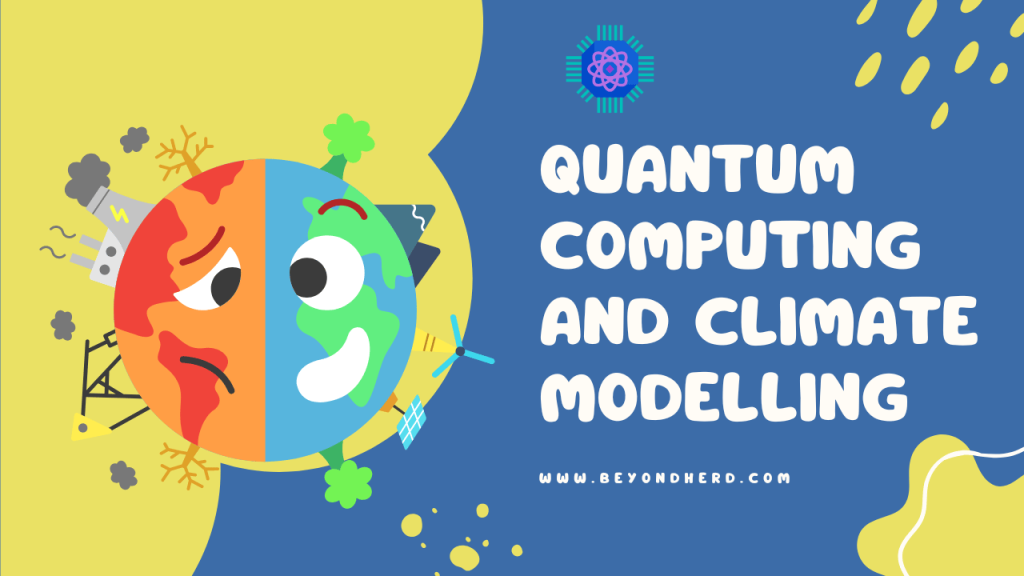In the ever-evolving world of technology, quantum computing emerges as a beacon of promise, particularly for sustainable practices. This high-tech wizardry, rooted in the principles of quantum physics, opens up unparalleled possibilities, with its potential applications transcending various sectors. But what role does it play in sustainable development, and what real-world examples do we have of its successful implementation?
In this enlightening article, we aim to unravel the mysteries surrounding ‘What is an Example of Using Quantum Computing for Sustainable Practices?’ and offer you a well-rounded understanding of its complexities. Get ready to embark on an insightful journey with us!
Quantum Computing: A Brief Overview
Before diving into the meat of the subject, let’s shed some light on what quantum computing is. Quantum computers operate on the principles of quantum mechanics, harnessing the peculiar behavior of quantum bits or “qubits” to perform complex computations exponentially faster than their classical counterparts. While a regular bit can be either a 0 or a 1, a qubit can be both at the same time, thanks to a phenomenon known as superposition. Quantum computers also leverage another quantum quirk, entanglement, allowing qubits that are entangled to instantaneously affect each other, irrespective of the distance separating them.
Now, how can this tech marvel serve the cause of sustainability?
Quantum Computing and Climate Modelling

Climate change, a pressing global concern, requires robust predictive models to understand and prepare for its impacts. Quantum computers, with their massive computational power, have the potential to significantly enhance climate modelling accuracy. For example, researchers at Singapore’s Centre for Quantum Technologies used a quantum processor to simulate the atmospheric carbon dioxide absorption process. The research team successfully demonstrated a proof-of-concept quantum simulation, marking a milestone in leveraging quantum computing for environmental conservation.
Renewable Energy Optimization through Quantum Computing
Another intriguing example lies in the optimization of renewable energy sources. Quantum algorithms can solve complex optimization problems far more efficiently than classical computers. Companies like Q-CTRL and D-Wave are working on algorithms that optimize the configuration of wind turbines and solar panels, maximizing energy output and reducing energy waste.
Quantum-enhanced Simulations for Sustainable Practices
Natural resources management, a cornerstone of sustainable practices, requires accurate simulations of complex natural phenomena. For instance, simulating the behavior of water at a molecular level is a computationally intense task that could benefit from quantum computation. IBM, a frontrunner in quantum computing, aims to leverage its quantum machines to simulate and analyze water’s behavior. This could lead to advancements in water purification technologies, a vital part of sustainable development.
Quantum Cryptography for Eco-friendly Practices
Quantum cryptography presents an eco-friendly solution to data security, as it consumes less energy than traditional cryptographic methods. By leveraging quantum principles, quantum key distribution (QKD) provides uncrackable encryption, ensuring secure communication with less energy consumption. ID Quantique, a Swiss-based company, is a pioneer in providing commercial QKD systems, contributing to sustainable and secure data practices.
Quantum Computing for Carbon Footprint Reduction
Quantum computing also holds promise for reducing industries’ carbon footprint by optimizing logistics and supply chain operations. Quantum-inspired optimization solutions are helping businesses minimize resource waste and improve efficiency, consequently reducing their environmental impact. Microsoft’s Azure Quantum and Volkswagen have collaborated to develop a traffic flow optimization solution that minimizes travel time and, in turn, reduces carbon emissions.
The Future of Quantum Computing in Sustainability
While the examples provided illustrate quantum computing’s potential in promoting sustainability, it’s essential to acknowledge the field’s nascent stage. Building practical quantum computers presents significant challenges. However, constant research and development are gradually overcoming these obstacles, with the promise of a future where quantum computing applications become a norm in sustainable practices.
Quantum Computing in Waste Management
One of the significant challenges we face in our push for sustainability is efficient waste management. Here, quantum computing could play an indispensable role. The complexity and enormity of waste management processes call for a system that can handle multiple variables simultaneously. Quantum computing, with its capacity to process extensive data at high speed, could provide optimal solutions for waste management.
Using quantum algorithms, we could efficiently track, sort, recycle, and dispose of waste. For instance, a quantum computer could help design an efficient route for waste collection, saving both time and energy. It could also aid in segregating waste, thereby improving recycling rates and reducing the amount of waste that ends up in landfills. Though practical implementation is still some way off, the potential is enormous.
Quantum Computing and Circular Economy
A circular economy is a sustainability concept that advocates for resource optimization, reducing waste, and creating more efficient systems. It’s about making the most out of the resources we have and creating systems that allow for easy reuse and recycling. Quantum computing could significantly aid this circular economic approach.
Through sophisticated quantum algorithms, we can improve logistics and supply chains, creating more efficient routes and reducing waste in the process. Quantum computers can help companies devise optimal manufacturing processes that use resources more effectively. They can also assist in creating systems that facilitate easy reuse and recycling of products, fostering a more sustainable, circular economy.
Quantum Sensors for Environmental Monitoring
Quantum sensors represent another field of quantum technology with promising applications in sustainable practices. They employ quantum phenomena to measure physical quantities such as temperature, pressure, and magnetic fields with exceptional accuracy.
Their extreme sensitivity can be instrumental in environmental monitoring. Quantum sensors can help detect minute changes in environmental parameters, providing valuable data for climate modeling and predicting environmental changes. They can also monitor pollutants at very low concentrations, helping in early detection and control of environmental pollution.
Quantum Computing: A Tool for Sustainable Agriculture
Quantum computing also extends its promise to the realm of sustainable agriculture. Given the increasing demand for food and the climate-related challenges that agriculture faces, new ways to enhance farming practices’ efficiency and sustainability are needed.
Quantum computing can help optimize crop yield, manage water resources efficiently, and even predict disease outbreaks. For instance, quantum algorithms can process a vast amount of data about soil quality, weather patterns, and crop variety to suggest the best combinations for maximizing yield. They can also aid in predicting pest outbreaks or diseases, allowing farmers to take preventive measures and reduce the use of pesticides.
The Role of Quantum Machine Learning in Sustainability
Quantum machine learning, a subfield of quantum computing, uses quantum systems to improve the computation and data processing capabilities of machine learning algorithms. This new approach can dramatically speed up data processing, pattern recognition, and making predictions.
In terms of sustainability, quantum machine learning can help analyze large-scale environmental data, detect patterns, and make accurate predictions about climate change. It can also be used to optimize renewable energy systems, improve energy efficiency in buildings, and help design more sustainable materials.
Looking Forward: Quantum Computing and Sustainable Practices
From the examples above, it is clear that quantum computing has the potential to make a considerable impact on sustainable practices. While we have yet to see many of these applications in full operation, the research and development happening in the field is promising. As quantum technology continues to evolve, its role in creating a sustainable future becomes ever more apparent.
Quantum computing, however, is not a silver bullet for all our sustainability challenges. It is a tool – a very powerful one – that we should use alongside other strategies in our pursuit of sustainable development. As we continue to innovate and advance in this field, it is crucial to remain conscious of our goals and ensure that technology serves humanity’s best interests. Quantum computing offers us an exciting path forward, and it’s up to us to tread that path wisely.
FAQs About What is an Example of Using Quantum Computing for Sustainable Practices?
How is Quantum Computing used to Promote Sustainability?
Quantum computing aids sustainability through various applications, including climate modelling, renewable energy optimization, natural resources management, eco-friendly data security, and reducing industries’ carbon footprint.
What are the Benefits of Applying Quantum Computing in Sustainable Practices?
Quantum computing can enhance the accuracy of climate models, optimize the use of renewable energy, contribute to better natural resource management, offer green solutions to data security, and help reduce carbon emissions.
Can Quantum Algorithms help in Reducing Carbon Emissions?
Yes, quantum algorithms can help reduce carbon emissions by optimizing various processes, such as traffic flow, logistics, and supply chain operations.
What Role can Quantum Computing play in Renewable Energy Optimization?
Quantum computing can solve complex optimization problems more efficiently, helping to configure renewable energy sources like wind turbines and solar panels optimally.
Also Read: What is the Darkest Legal Tint in Texas? (All You Need to Know)
Wrapping Up
The possibilities for quantum computing in sustainable practices are truly exciting, despite being in the early stages of realization. This groundbreaking technology holds immense potential to revolutionize the green sector, from climate change modelling to renewable energy optimization, and from natural resources management to eco-friendly data security. As we continue to innovate and advance in this field, we’re paving the way for a future where technology and sustainability go hand in hand, creating a better world for generations to come.
To sum it up, this article has shed light on various aspects of “What is an Example of Using Quantum Computing for Sustainable Practices?” providing valuable insights and answering your most pressing questions.





